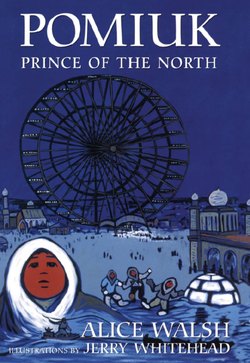Читать книгу Pomiuk, Prince of the North - Alice Walsh - Страница 5
На сайте Литреса книга снята с продажи.
1 The White Men
ОглавлениеIt is autumn in Labrador, and the colour of the land has faded from emerald to gold. The nights are colder now. Soon winter will be upon us. Already the lakes and ponds are freezing over. Every morning before daylight I row to the headlands with Kupah, my adopted father, and Kippinguk, my adopted brother. We fish for salmon and hunt the birds that fly in great numbers. Fall is an important season for us, because it is the time of the great caribou hunt. Caribou provide much of our food and clothing, and our survival depends largely on the hunt.
This morning we search the ground for hidden nests, filling the hoods and pockets of our parkas with warm eggs. The eggs are delicious, and sometimes I eat until my belly is full. Today, though, my thoughts are not on the eggs. As I empty the nests, I think only of the strange men who visited us in the summer. Whenever I think of them, I am filled with dread. My stomach is like a knot in a rope.
I was standing outside my tupek, our summer house, when their ship Everlina anchored in the harbour. She was a big ship—the largest I had ever seen. Black smoke came from her top, and her whistle was as loud as thunder. The noise frightened the birds and caused our dogs to howl fearfully. Men, women, and children ran out of their tupeks to the water’s edge.
We watched quietly from the shore as a small boat was lowered into the water. Two white men climbed down a rope ladder into the boat. They paddled quickly toward us, their oars making circles on the calm, dark water. As they approached the shore, our chief raised his hand in greeting. Two of our men helped the white men haul their boat onto the beach.
The white men were giants. One, with dark hair, had brown eyes set wide apart His face was thin and pointed. He smiled, revealing a gold tooth that looked out of place among the other teeth that were white like our own. The other man had pale blue eyes, like the sky on a winter day. His hair was the colour of the sun when it sinks low in late evening. It grew on the sides of his face and on his chin. The younger children were frighened by the strangers and hid behind their mothers’ parkas. The older children, and even some of the women, held their hands over their mouths to conceal their laughter.
The arrival of the strange men caused much excitement all over our village. Everyone, young and old, came to see them. We learned that the man with the odd hair was Matthew; the other was named James. They came from a place called Chicago in the United States. Only Matthew could speak our language, though at times he got words mixed up and was hard to understand.
He told us about Christopher Columbus, and about a celebration, a “world’s fair,” they were having in his honour. An “exposition,” Matthew called it, and he wanted us to return with him to America for the celebration. He told us about a marvellous White City they were making, with buildings of great size and beauty. There would be things called “electric lights” that went on and off like magic. And there would be machines called “telephones” that allowed people to talk to others who were far away.
“The exposition will be next year, in 1893,” Matthew said. “It is the age of steam, electricity, and technology. We will soon enter the twentieth century.”
His words meant nothing to us until he told us about the many rewards we would receive. He called the White City the land of plenty, where everything we needed would be provided. There would be money to buy supplies and food. We would never have to go hungry again. As he spoke, many of our people were wide-eyed. I knew they were thinking of all the times we had gone without food. The winter before, two of our dogs had died from hunger. Food was so scarce that some of the old people had refused to eat. They wanted the young to have their portions because they felt we needed the energy more than they did. But I could not believe my ears when some of our village men said they would go to America. Others said they would think about it.
“We will return next spring,” Matthew said.
After the Everlina sailed for America, Kupah spoke endlessly of the rewards we had been promised. “Come spring we will go to America,” I heard him tell Kootookatook, my adopted mother.
I stared long and hard at Kupah. “Are we going to America, too?” I finally asked him.
“Yes, Pomiuk. The white men promised us many things. In America we will never be hungry. And when we return we will have everything we need to make our life better.”
That night I lay awake for many hours. When I fell asleep at last, I dreamed of weasels. My dream left me with an uneasy feeling. To dream of weasels is a sign of trouble to come, and since that vision I have been afraid that something bad will happen to us in America. Perhaps I should warn Kupah, but I am only an orphan, and I know my place.
Every day now I think of the white men and wait anxiously for their return. Although spring is far away, the image of the Everlina is still strong in my mind. I sometimes gaze across the water, half expecting to see the ship appear around the cliffs.
